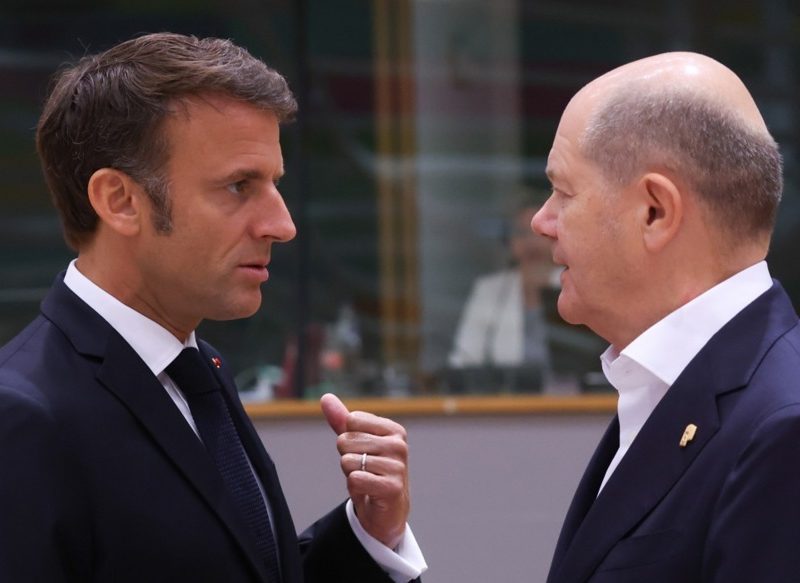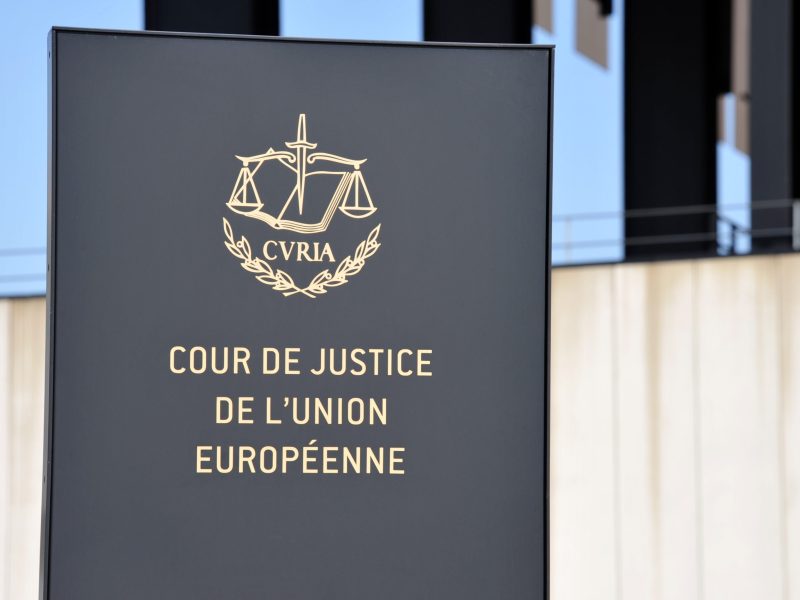Welcome to EURACTIV’s Green Brief, our weekly selection of energy and environment news from across Europe. To subscribe, follow this link. You can also subscribe to our daily newsletter here and to our comprehensive weekly update here.
Twenty-eight people dead, thousands of animals burned, properties and businesses destroyed, and 93,880 hectares of land incinerated – this is the provisional toll of the unprecedented wildfires that have ravaged Greece in recent weeks. But it didn’t have to be this way.
The fire at Evros, in the northeast of the country, has been burning for two weeks, making it the largest ever recorded in the European Union.
Exacerbated by the climate crisis, the fires progressed amid one of the hottest and driest summers this year, with heatwaves raising the risk level to the highest level in years.
Earlier this summer, Rhodes island, Evia island, and the Thessaly region were also gravely affected, while the Attica region battled its own blazes when fires passed through villages in the Parnitha mountains.
Greece activated the EU’s Civil Protection Mechanism twice during the summer because of the severity of the fires, receiving immediate air and ground support from numerous European countries.
Poor prevention
But while the impact of climate change cannot be ignored, it was not the only factor at play.
When the ruling conservative New Democracy party came to power in 2019, the government announced new fire prevention and protection measures following several devastating blazes in the previous years.
The measures, ranging from upgrades in the firefighting forces to a national warning system and forest clean-ups before the summer, were meant to prevent wildfires from spreading unhindered during the dry season.
But as this year’s events demonstrated, they were not enough.
Vasilis Kikilias, Greece’s climate crisis and civil protection minister, admitted that the measures did not yield the desired results, as fires appeared and spread rapidly across the country.
Despite an increase in active personnel and firefighting vehicles, authorities proved unable to contain the blazes that raged on for days.
However, the scale of destruction could have been avoided had more attention been paid to prevention and preparation before the start of the fire season, Greek environment experts maintain.
Members of the opposition were quick to point out the lack of preparedness and the insufficient progress made in the implementation of the government’s measures since they were introduced.
The government was also criticised for failing to take into account the recommendations put forward by the opposition to adapt Greece’s civil protection mechanism and forest management system.
Rising from the ashes
While authorities are still assessing the full extent of the damage caused by the fires, the government has already set out plans for the recovery of the affected areas and compensation for people whose livelihoods have been affected.
Prime Minister Kyriakos Mitsotakis announced on Thursday (31 August) ten new measures for the prevention and containment of wildfires, with increased responsibilities for municipalities to prepare ahead of the summer season.
The reforestation of 66,000 hectares of land, with priority given to Evros and Parnitha, is scheduled to take place over the next two years. Special attention will be paid to forested areas near protected archaeological sites, which will be equipped with cameras.
The civil protection mechanism is also set to receive a significant upgrade through a program named “Aigis”, meant to improve the infrastructure, equipment, coordination and communication between the firefighting forces, municipalities, and other actors involved.
In addition, the Ministry of Environment and Energy is starting urgent erosion and flood protection works to secure the damaged regions in the coming winter months.
Lastly, tougher sentences and fines will be slapped on arsonists who have been accused of fuelling the fires.
But as Greece recovers from one of its most devastating summers ever, what dominates is the feeling of an immense waste that could have been contained, if not avoided altogether.
As summer droughts and heat are set to worsen with the climate crisis, fire prevention needs to move up on Greece’s political agenda.
“Climate change is here. Big challenges are here and we need a national response plan that prioritises prevention,” said Nikos Androulakis, president of centre-left PASOK.
– Annita Elissaiou
Welcome back! Summer holidays are over, and the Green Brief is back and ready to tackle all things energy and environment in the European Union.
Below is a summary of the essential news that happened over the past month. Looking forward, it’s bound to be a busy autumn, with many pieces of Green Deal legislation still pending in Parliament and Council as well as a highly anticipated COP28 summit in Dubai.
And in case you missed it, take a look at our special report on Europe’s melting glaciers, published over the summer, which dives into the multifaceted consequences of climate change on the continent’s mountain regions.
THE HAGUE. Dutch grant more fossil fuel subsidies than previously thought. The government currently provides larger subsidies than previously thought despite its promise to phase out fossil fuel subsidies by 2025, a recent study by several climate action groups shows. Read more.
WARSAW. Poland to establish energy transition ministry. The Polish government will set up a new Ministry of Energy Transition if the ruling camp secures its third consecutive term in power following October’s elections, Prime Minister Mateusz Morawiecki announced on Sunday. Read more.
LJUBLJANA. Slovenia close to signing gas pipeline deal with Hungary. Slovenia and Hungary are expected to sign a memorandum on constructing a pipeline linking their natural gas networks in October, less than a year after the proposed project was first made public by the countries’ prime ministers. Read more.
SOFIA. Russian oil fuels new political crisis in Bulgaria. Bulgarian political stability is threatened by a fuel market crisis as the ruling coalition wants to cut dependence on Russian oil, which would mean clashing with Russian private company Lukoil, which owns the Burgas refinery and has a monopoly on the wholesale market, several EURACTIV sources in parliament and government confirmed. Read more.
BERLIN. Greens eye French, Spanish model for German energy subsidies. Germany could subsidise electricity prices despite EU state aid rules, the Green Party, a junior partner in Chancellor Olaf Scholz’s coalition government insisted, pointing to efforts by France and Spain to extend their own subsidies. Read more.
PARIS. French energy regulator: Nuclear alone not enough for carbon neutrality. If France is to achieve carbon neutrality by 2050, it must integrate renewables into its energy mix, according to the head of the country’s energy regulator, RTE, who believes nuclear power alone will not be enough. Read more.
BRATISLAVA. Slovakia stops relying on Russia for nuclear fuel. A new deal with US firm Westinghouse means that 18 months after Russia invaded Ukraine, Slovakia has diversified its suppliers of crucial energy materials and is now looking to France for another source. Read more.
European Commission sued for insufficient climate action. Environmental groups CAN Europe and the Global Legal Action Network have filed a lawsuit against the European Commission, saying the EU’s target to reduce net greenhouse gas emissions by 55% by 2030 is insufficient to meet the Paris climate goal and protect fundamental human rights.
The two NGOs are calling for a revision of the Implementing Decision that sets national annual emissions allowances, highlighting the need for higher emission reduction targets so that the EU can deliver on its climate commitments.
“The 2030 milestone is a crucial one and the EU has to ramp up emissions reductions and achieve at least a 65% cut by then,” said Romain Didi, CAN Europe’s expert on climate governance and human rights policies.
“The EU has to accelerate its emission cuts to be in line with science, previous legal commitments and the need to keep all its citizens safe from dangerous climate change.” (Annita Elissaiou | EURACTIV.com)
////
Environmental NGOs wary of Wopke Hoekstra’s nomination as Climate Commissioner. The “Green10” group of environmental NGOs has sent a letter to European Commission president Ursula von der Leyen to express their concerns about the candidacy of Wopke Hoekstra.
The right-wing Dutchman was named by The Hague to replace EU Climate Commissioner Frans Timmermans who has left Brussels to campaign for the Dutch elections.
The NGOs argue that Hoekstra does not possess the credentials to push ambitious EU climate targets for 2040, meeting the 1.5°C goal of the Paris Agreement, and finalising the adoption of EU laws tabled as part of the European Green Deal.
Hoekstra’s lack of experience in the field of climate policy and his past tenure in oil giant Shell and the Dutch government are the basis of the Green10’s concerns.
The organisations call on president von der Leyen to take personal responsibility for the Commissioner’s appointment, in order to ensure the EU’s climate agenda is advanced. (Annita Elissaiou | EURACTIV.com)
////
Industry groups want aluminium added to EU’s list of Strategic Raw Materials. Twelve European industry association in the raw materials, clean tech and aerospace & defence sector have called on policymakers to include aluminium in the strategic raw materials list of the Critical Raw Materials Act (CRMA).
With the demand of aluminium expectyed to increase in the coming years, a disruption in supply could have immense consequences for several industries. For this reason, the strategic significance of aluminium must be recognised, the associations argue in a joint letter to the European Parliament. (Annita Elissaiou | EURACTIV.com)
////
Paris climate targets unattainable with green growth, study finds. A study by the Lancet Planetary Health reveals that high-income countries’ emissions reductions celebrated as “green growth” fall short of the targets set in the Paris Agreement on climate change.
Countries who claim to have successfully decreased their CO2 emissions while increasing their GDP are not on track to achieve the targets and fairness requirements for limiting global warming under 1.5°C, the study says.
At the current rate, it will take up to 200 years for those countries to achieve zero emissions. “There is nothing green about economic growth in high-income countries”, said the lead author of the study, Jefim Vogel, from the Sustainability Research Institute at the University of Leeds, UK. “Calling such highly insufficient emission reductions ‘green growth’ is misleading, it is essentially greenwashing,” he said.
A shift to a “post-growth” approach, by reducing energy demand and enhancing energy efficiency, can contribute to meeting the Paris goals on time, the study concludes. (Annita Elissaiou | EURACTIV.com)
Last week, EURACTIV’s Beyond the Byline podcast looked at the wildfires that have ravaged southern Europe over the summer. Presenter Evi Kiorri asked three experts about their views on what is driving the fires, how can they be prevented, and how ecosystems can recover.
The three guests are:
- Christiana Photiadou, expert on climate change vulnerability and adaptation at the European Environment Agency;
- Zita Sebasvari, Senior Scientist at the United Nations University – Institute for Environment and Human Security (UNU-EHS); and
- Lindon Pronto, senior fire management expert at the European Forest Institute and ex firefighter.
> Listen to the podcast here.
- 7 SEPTEMBER. High-Level Electricity Grids Forum, with speakers including Kadri Simson and Teresa Ribera
- 7 SEPTEMBER. Parliament ITRE committee vote on improving protection against market manipulation in the wholesale energy market. This is likely to be passed without a plenary vote
- 7 SEPTEMBER (tbc). Parliament ITRE committee vote on Critical Raw Materials Act
- 13 SEPTEMBER. State of the Union address
- 2 OCTOBER. Foreseen plenary for vote on Packaging and Packaging Waste Regulation
- 6 OCTOBER. Trilogue on Energy Performance of Buildings Directive (EPBD)
- 12 OCTOBER. ITRE committee vote on Net Zero Industry Act
- 16 OCTOBER. Environment Council
- 23-24 OCTOBER (tbc). ENVI committee vote on Packaging and Packaging Waste Regulation
- 26-27 OCTOBER. European Council
- TBC in NOVEMBER. Plenary vote on Packaging and Packaging Waste Regulation
- 30 NOVEMBER-12 DECEMBER. UN Climate Change Conference (COP 28), Dubai
- 14-15 DECEMBER. European Council
- 18 DECEMBER. Environment Council
- 19 DECEMBER. Energy Council
- Q4. Revision of REACH regulation
[Edited by Zoran Radosavljevic and Frédéric Simon]




